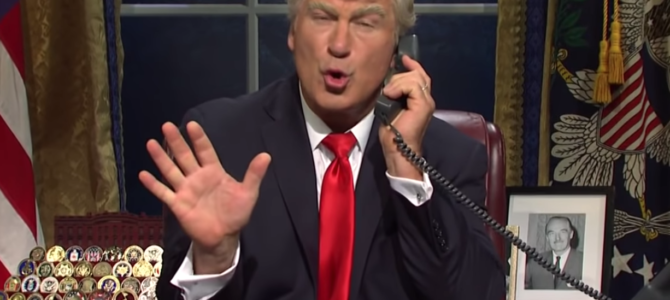
Now that the first two episodes of the 45th season of “Saturday Night Live” have passed, it seems the ultra-lefty writing team has chosen to continue opening each show with a several-minutes-too-long series of bad and mean-spirited impressions of the Trump administration that simply aren’t funny.
It’s the same playbook they’ve used since Donald Trump became a serious contender for the White House: Paint Trump as a buffoonish, conniving dictator (portrayed badly by a squinty-faced Alec Baldwin), shove Kate McKinnon into a weird impression of whichever Trump ally has been featured in the news that week, and go on for a painfully long seven minutes as each character confesses how evil they actually are.
The current game plan for lampooning the Trump White House on SNL is jarringly one-sided, evident of writers who fail to find any kind of humor in an administration that serves it up on a silver platter. Baldwin, seeming to recognize that he wasn’t bringing much to table with his Trump impression after last season, declared he was done with the role just a few months ago. Yet he has returned for both episodes of the new season in an entirely unaltered effort to make the president look bad without injecting any nuanced humor.
The un-evolving Trump impressions, however, do not reflect the SNL writing team’s ability to successfully satirize public political figures. In the premiere episode last weekend, the “Impeachment Town Hall” sketch delivered nuanced, researched, and restrained impressions of the field of 2020 Democrats that were funny to everyone, regardless of political affiliation.
So if the writers are capable of crafting a sketch that embodies the best of political satire, why do they refuse to apply that skill to the cold open and the Trump administration? SNL’s attempts to attack Trump and his inner circle through impressions are far too “on the nose.”
Satire, as I pointed out last month in writing about SNL’s ill-fated attempt to net conservative viewers, should walk right over the line from reality to absurdity. It shouldn’t turn reality into a politically biased opinion that paints every character in a sketch as a corrupt villain.
Yet British Political Humor Is Actually Funny
Perhaps SNL could look to British political satire for a lesson in subtly when drawing humor out of the Trump news cycle.
Beyond the failings of SNL’s cold open, political humor in America has a long history of falling short of the mark where its British counterparts have been hailed as genius. “House of Cards,” for instance, was originally a British trilogy of mini-series featuring Francis Urquhart, an embodiment of antics and emotion in Parliament we can only scratch the surface of through the drama of Brexit, who at once makes viewers love him and loathe him. It begs curiosity for life behind the scenes in London politics.
The American version of “House of Cards,” however, seemed to totally miss the mark of how hilarious it can be to sell your soul for political advancement, instead turning in a drippy melodrama only flirting with humor through Frank Underwood’s less-than-biting southern wit.
“House of Cards” wasn’t the first instance of Britain delivering truly remarkable political humor. In fact, it’s been a specialty of theirs for many years. “Yes, Minister,” “Yes, Prime Minister,” and “In the Thick of It” were all exceptional, plotted British shows about the absurdity of politics in the United Kingdom. All three shows, the latter of which served as the inspiration for HBO’s “Veep,” explored the fallibility, misplaced arrogance, and utter futility of the political protagonists as they attempted to achieve their unattainable goals.
American political shows, with the notable exceptions of “Veep,” the brilliant single season of “Braindead,” and the lesser-known and only vaguely funny “Alpha House,” lean heavily toward dramatic virtue signaling. The much-beloved and highly viewed “West Wing” portrayed the absurdly perfect Jed Bartlet as a president burdened only with caring too much, being too wise, and never choosing himself first — a far cry from the highly fallible anti-heroes of Francis Urquhart and Selina Meyer, who both more closely resemble real politicians than Jed Bartlet ever could.
‘Saturday Night Live’ Has An Opportunity It Isn’t Taking
Prime-time network television has long stuck to the “very serious only” formula for political shows with mixed results, including “Scandal,” “Madame Secretary,” and “State of Affairs.” This adherence to drama leaves a gap in political humor that should leave the door wide open for “Saturday Night Live” to take a cue from British political television. There is plenty of room for sketches about a gaffe-prone, overly ambitious politician who simply cannot get out of his own way.
There’s ample opportunity to lampoon any number of conservative politicians in the SNL cold open using the methods subtly employed by the Brits, without calling Mike Pence a “sacrificial patsy,” replacing Stephen Miller with a snake, or suggesting Steve Bannon is the grim reaper to make an obnoxious, flat, humorless point.
What British political comedy understands and that American television shows and SNL in particular seem to be missing is the ability to strike a balance between the seriousness of politics and the absurdity of it. The British shows listed in this article looked past the headlines and created almost storybook-like, comic fantasies of what life in politics could be.
The patience expressed by British humor is what seems to be mostly missing from SNL’s attempts to take on the era of Trump. What a great show opening it could be if, instead of egregious, partisan POTUS-bashing, “Saturday Night Live” took a breath and explored the possibilities of nuanced, patient impressions.









